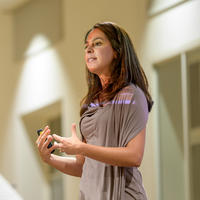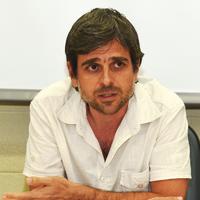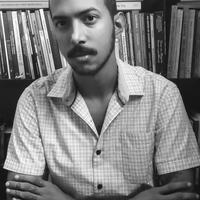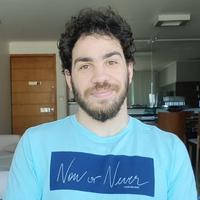Research team

|
Principal Investigator
Dr Andreza Aruska de Souza Santos
Andreza is the director of the Brazilian Studies Programme and Lecturer at the Latin American Centre, University of Oxford. Her work is mainly concerned with local governments and participatory policies . Given her interests in local governance, Andreza is currently looking at sub - national responses to the pandemic in Brazil and has examined the impact of inequality in health policies. Her work has featured in Journals such as Nature Human Behaviour, Science, The Lancet, Ethnography, and others. She is the author or editor of three books focusing on cities in the global south. Previously, Andreza worked at the School of Anthropology, also at Oxford, where she is still involved in teaching on ethno graphic methods. She completed her Ph.D. in Social Anthropology at the University of St Andrews, M aster’s in social sciences at the University of Freiburg, University of KwaZulu Natal and Jawaharlal Nehru University; and Bachelor’s Degree in Political Scie nce at the University of Brasilia. |

|
Principal Investigator
Gabriel Feltran is professor at the Department of Sociology of UFSCar , Brazil. Researcher at the CEBRAP, he is a former academic visitor of the LAC University of Oxford, as well as visiting Professor at Goldsmiths University of London (2019), Humboldt University (Berlin - 2017), CIESAS (México - 2015) and Sciences Po (Paris - 2013). He obtained his PhD in Social Sciences (2008) at the State University of Campinas (Brazil), with a collaborative period at the Ecole des Hautes Etudes en Sciences Sociales (EHESS - France). Currently researches criminal groups and transnational i llegal markets in Brazil, being the Principal Investigator of the GLOBALCAR Project: a transnational urban research on vehicle informal economies (Europe, Africa and South America - Agence Nationale de Recherche/FAPESP). Author of "The Entangled City: crim e as urban fabric in São Paulo (Manchester Univesity Press, 2020)" and editor of "Stolen Cars: a journey through São Paulo's urban conflict" (Wiley 2021 in press). |

|
Valéria Cristina de Oliveira
Valéria is professor at Faculdade de Educação (Faculty of Education, FaE) at Universidade Federal de Minas Gerais (Federal University of Minas Gerais, UFMG). She's also a researcher at Centro de Estudos em Criminalidade e Segurança Pública (Center for Crime and Public Safety Studies, CRISP) and at Núcleo de Estudos em Desigualdades Escolares (Research Center on School Inequalities, NUPEDE). She has been researching on school violence, neighbourhood and violence, and school inequalities and public safety policies in peripheral areas. Valéria was a visiting doctoral student at Florida State University (2015) and a Post-doctoral researcher at Centro de Estudos da Metrópole (Center for Metropolitan Studies, CEM) (2017). She is a Bachelor in Social Sciences (2006) and got her Master's (2012) and PhD (2016) in Sociology at the UFMG. She has prior experience in state public administration of public safety policies (2007-2010) and on social development in the Brazilian federal government (2010-2012). |

|
Dalson Figueiredo
Dalson Figueiredo is an associate professor of Political Science at Federal University of Pernambuco, Brazil. He also serves as the current head of the Political Science Graduate Program. Dalson obtained his Ph.D in Political Science from UFPE and was previously a visiting scholar at Nottingham University (2018) and University of Wisconsin, Madison. As an undergraduate, he was an exchange student at University of Texas, Austin. He and his research group apply empirical methods in many areas of scientific research, focusing on transparency and reproducibility. Dalson´s second book, Métodos Quantitativos em Ciência Política, provides an introduction to quantitative methods in political science. The book was a finalist at the 2020 Brazilian National Association of Graduate Studies and Research in Social Sciences award (ANPOCS). He has published in different journals, such as Model Assisted Statistics and Applications, Journal of Public Health, Journal of Applied Mathematics and Physics, Reports in Public Health, Applied Mathematics, Brazilian Political Science Review, The Journal of the Brazilian Society of Tropical Medicine, Revista Latinoamericana de Metodología de la Investigación Social and Brazilian Journal of Biometrics. He also works as a catalyst of the Berkeley Initiative for Transparency in the Social Sciences. While in Oxford, Dalson will be working on a data gathering project about corruption in Brazil. |

|
Adson Ney Amorim
Pursuing a Doctorate at the Federal University of São Carlos Program (UFSCar); Master in Sociology with a Bachelor's Degree in Social Sciences by the Federal University of Alagoas (UFAL). Member at the Peripheries, Affections and Economics of Symbolizations Research Group (GRUPPAES), the Memory, Identity and Territory Research and Study Group (GPMIT), even as the Urban Researches Center (NaMargem - UFSCar). Operates in the Sociology field, with emphasis on Urban Sociology, Sociology of Social Movements and Brazilian Social Thought. Currently dedicated to developing ethnographic researches on the themes: urban conflict, social inequalities, territorial governments, politics and aesthetics. |

|
Antonio Henrique Pires dos Santos is a Political Science and International Relations PhD candidate at Federal University of Pernambuco (UFPE), and holds a BA in Law and a MA in Political Science and International Relations from the same university. In his thesis, he aims to describe how members of the United Nations Security Council (UNSC) refer to intervention in international conflicts, applying a text-as-data approach to analyse their speeches. His research interests include the United Nations, international security, and text-as-data. |


